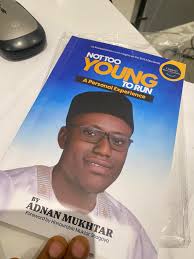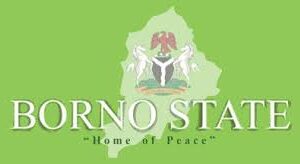The Age Reduction Bill, alias Not Too Young To Run bill, is a constitutional amendment movement led by young Nigerians. The bill was conceived and pushed by several civil society groups, including YIAGA
Africa, beginning in May 2016. The bill seeks alteration in sections
65, 106, 131, 177 of the Constitution of Nigeria, which has reduce the
age of running for elective positions for the house of Assembly and
House of Representatives from 30 years old to 25 years old, Senate and
Governorship from 35 year old to 30-year-old and office of the
president from 40 to 30 and independent candidate in Nigeria (YIAGA
Africa 2018). The Not Too Young To Run is an act of parliament, which
reduced the age limit of running for elective offices in Nigeria (UN
2017 as cited by Wikipedia), it’s youth political advocacy formed in
- The campaign started in support of bills and motions in
Nigeria’s National Assembly sponsored by Tony Nwulu in the House of
Representatives and AbdulAziz Nyako in the Senate.
With the signing the Not Too Young To Run Bill in 2019 Adnan gained
momentum to contribute his quota to national development as his major
concerns are health, education, empowerment and youth development for
a better tomorrow.
Not Too Young To Run: A Personal Experience is an eponymous memoir of
Adnan Mukthar Tudun Wada narrating the experiences of a young zealous
Nigerian on his political journey and some of his major events towards
bringing impactful changes and breaking the barriers posed on youth
candidacy in his constituency and Nigeria in whole.
The book opens with a foreword by Hon. Muktar Tolani Shagaya Federal
LawMaker from the 10th Assembly Representing Ilorin West/Asa
Constituency. The book has thirty chapters dichotomised in two parts.
The first parts recounts the author’s biography with his genealogy at
the both side of his parents were both born and bred in Tudor Wada
Nassarawa Local Government Area Kano. The book also travels with us
through his journalism adventure, political ambition, and issues
surrounding the Nigerian political spec.
Similarly, the second segment of the book entails articles published
by the author, his commentary on Nigeria politics, the plight of
students’ activism, interviews during his political aspirations at the
time of electioneering. The part also cover significant contributions
of resourceful individuals towards national development, insights on
the lesson learnt by the author and pave ways which youths can adhere
to curtail the menace of youthful misrepresentation and provide a
guide for young leaders with mindset of making massive contributions
in the Nigerian political arena and the country at large.
The first part
The book highlight major challenges young aspiring leaders encounter
in their political voyage, in reference to the text, Adnan had
encountered such obstacles ranging from skepticism and doubt among
fellow youths, acquaintances, and associates, and critiques of his
financial status. However, amidst these aforementioned challenges,
there are internal hindrances within the Nigerian political parties
which pose problem to youths such include exorbitant prices of forms
which always thwart young leaders from navigating the atmosphere of
politics nationwide and it’s a tradition for all the popular political
parties that the price of their nomination forms is not favouring
young leaders who have enthusiasm for positive change in the country.
Furthermore, the book expose the filthy tradition of godfatherism in
the circle of Nigerian political system, using Adnan as a case through
the lens of this book, the party delegates and the party elders went
against him because he was never a candidate of top politicians, and
he did not belong to the circle, this also prompted him to join a new
political party (UPC) to escape being a political dog, this is a great
lesson to our youths who are vieying for public office in politics.
The book also portrays a riddle of smaller political parties, such as
the domination of power politics driven by money politics,
favouritism, our citizens too don’t promote candidates from unpopular
party, the dominance of the major parties APC and PDP is also a threat
to candidates contesting under smaller platforms, the culture of
transactional politics for support hamper young leaders from winning
election especially at the top level, the issue of vote buying during
campaigns and elections, and the exchange of incentives for votes
which undermines integrity of electoral process in Nigeria.
The book swims with us how leaders in power tried to cripple the
effective representation of youths’ candidacy in politics as evident
with Adnan’s feud with Kwankwasiyya cult which made him rejuvenate
his political aspiration in another political party UPC. Adnan
effluxed the Kwankwasiyya cult from APC to PDP until they part ways
due to undermining his candidacy by seeing him unfit for the task
despite his staunch loyalty to the movement, he lost Kwankwaso’s
endorsement for the representative seat he was yearning for with an
ungrounded claims that he lacks finance to support campaign, he is not
married (at that time), although Not Too Young To Run Bill was
approved but the cult used his age stop his endorsement and he felt
that the movement has no intention to empower young candidates
entirely.
The book also feeds us with strategic planning on how youths or any
candidate contesting will strategise so as to foster effective
campaign and allow one’s political activity to flourish and hectic
free. Adnan strategised through creation of different teams and
committees for campaign throughout the political journey. The teams
are poster distribution and rally, media team, campaign team,
grassroots mobilisations, design and materials, coordination and
support. These allowed division of labour and stress free in the
political walk of life.
The book also discussed other lingering matters among the current
author’s party PDP at the national level prior to the elections and
the emergence of Kwankwaso’s NNPP.
These obstacles as narrated by the author highlight the need for
reformation in Nigeria’s political avenue, with emphasis on quick
address on such issues that hinder youth involvement and
participation, through this transparent governance can be achieved
like other developed countries.
The second part
Contextually, in the second part of the book, the author presented
most of his articles about national issues, tribute to his late father
Mukthari Adamu Esq (may Allah continue to rest his soul in peace) and
his friend the late Shehu Atiku (may he too continue to rest in peace)
which both shaped his life in all aspect of human development.
In this part, the author appreciates the contributions of a veteran
journalist Mallam Yusha’u Shu’aib who is making impacts on journalists
and aspiring journalism students, and gives Northern Nigeria a
journalistic voice against all odds. In addition, he also expressed
his gratitude to Prof. Adamu Gwarzo, the late Alhaji Bashir Tofa for
their onerous efforts towards humanitarian development within the
masses, and also the author appraise the mentorship of his mentors in
the book chapters with people Alhaji Ibrahim Amin (Little), Ja’afar
Ja’afar etc.
In one of its chapters the author makes a positive comparison and
praise of Buhari’s civilian regime versus IBB’s own in terms of
national development.
On the other hand, the author openly called for action in one of his
articles to the then president Muhammad Buhari regarding the hardships
that culminated at that time.
The author’s invitation to the DSS on planned students’ protest
against change of name of their parent institution from Northwest
University Kano to Yusuf Maitama Sule University when he was students’
leader in the university, the two author’s interviews with different
media outlets like Premium Times at the tensed time of election where
he affirmed his candidacy, and his shared insights of leaving the
shade of Kwankwaso also enrich the book with great features and
adherence of nonfiction as literature. I admire the diction used in
the book, it’s simple and accessible embellishments in tropes adding
readable aesthetics to anyone reading it.
In conclusion the book is a powerful guide and testament to the
potential young leaders who have interest in politics, it’s a must
read book for every Nigerian which will help towards the understanding
the nature of the country’s political system and its upheaval.
Aliyu Idris,
Sokoto, Sokoto state
[email protected]




